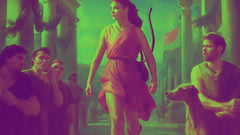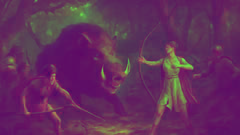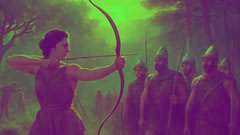Introduction
In the cradle of ancient Greece, where wild olive trees clung to rocky hillsides and the gods were known to walk beside mortals, there lay the kingdom of Calydon—a realm lush with orchards and haunted by legends. The people here lived under a sky alive with myth, their every harvest and hunt a quiet prayer to capricious Olympian deities. King Oeneus, Calydon’s wise ruler, was no stranger to the importance of ritual: year after year, he honored all gods with the choicest share of his crops. But one autumn, in a moment of forgetfulness—or perhaps fate—he neglected to offer thanks to Artemis, the goddess of the wild and the hunt. It was a slight she would not tolerate. That winter, the moon hung heavy, and the wind carried the scent of something untamed. From the dark heart of the forest, Artemis sent forth a beast not seen in the memory of mortals: a boar of monstrous size, with bristles sharp as spearheads, eyes like burning embers, and tusks that could gouge the bark from ancient oaks. It crashed through vineyards and wheat fields, uprooting centuries-old trees and scattering the bravest of hunters. Men whispered of it by firelight, fear clinging to their words. No fence could hold it, no arrow could pierce its hide. Crops withered, livestock vanished, and the people of Calydon grew desperate. To save his land and his honor, King Oeneus called for the bravest heroes of Greece. Word spread across seas and city-states, drawing warriors whose names would echo through ages: Meleager, the king’s own son, fated for glory; the swift-footed Atalanta, raised by bears and favored by Artemis herself; Castor and Polydeuces, sons of Zeus; mighty Theseus; and many more. Each brought their own motives—glory, redemption, rivalry, or the lure of a prize promised to the slayer of the beast. Atalanta’s presence, a woman among men, sparked pride and resentment in equal measure. As dawn broke over Calydon, the band gathered—heroes draped in bronze, hope flickering beneath anxiety, as the hunt for the Calydonian Boar began.
The Gathering of Heroes and the Challenge of Pride
The king’s summons reached far and wide, stirring the hearts of both the bold and the restless. Along dusty roads and over storm-tossed seas, men and women of legend answered the call. Meleager, handsome and fierce, was the first to stand before his father, offering not just his skill but his very fate—a prophecy hung over him, one that his mother, Queen Althaea, guarded with a secret dread. He welcomed the challenge, seeing in the hunt a chance to carve his name into legend. Others followed: Castor and Polydeuces, twins born of Leda and Zeus, their bond as unbreakable as their courage; Jason of Iolcus, leader of Argonauts, bearing scars from other adventures; the towering Theseus, whose deeds already filled songs; Peleus, soon to be father of Achilles; and Iphicles, Heracles’ half-brother, whose shadowed past lent him a grim resolve. Each arrived with a retinue, each with a tale, and each carrying ambitions too large for the city walls. Yet when Atalanta entered the courtyard, silence fell. Her hair shone like autumn wheat, her eyes keen and unflinching. She wore a hunter’s garb—leather tunic, quiver at her back, and a bow crafted for Artemis’s own hand. Men stared, some with curiosity, others with disdain. How could a woman stand beside them in so grave a contest? But Meleager, his gaze unwavering, stepped forward. “Atalanta has Artemis’s favor. Let none question her right,” he declared, his voice echoing off marble columns. Some bristled—Ancaeus, famed for his strength, laughed openly. “The boar will run when he scents a woman’s perfume!” Others whispered tales of Atalanta’s speed and skill: how she had outrun the wind, felled stags with a single arrow, and survived alone in forests haunted by wolves. The king, sensing discord, spoke: “Let the gods judge worth. Glory awaits not those who scorn their fellows, but those who honor courage, wherever it is found.” The heroes gathered for the evening feast—wine flowed, lyres sang, and old rivalries flickered like candlelight. Beneath the merriment, tension simmered. Who would claim the prize? Whose pride would falter before the beast? In private corners, Atalanta listened to the boasts, her face unreadable. She knew what was at stake: not just the fate of Calydon, but her place among heroes. That night, the elders performed sacrifices at Artemis’s altar. Smoke curled to the heavens, carrying hopes and fears alike. The goddess’s statue loomed, serene and implacable. In the hush, Meleager approached Atalanta. “You hunt for more than glory,” he said quietly. She met his gaze. “I hunt for Artemis—and for myself.” Morning brought a hush over the camp. Dew clung to grass as the hunters assembled. Dogs barked and strained at their leashes; horses pawed the earth. The air trembled with anticipation. The king presented each hero with a spear, but Atalanta refused, choosing her bow. “The forest is no place for vanity,” she said simply. As they entered the woods, the world narrowed to the thrum of their own hearts and the whisper of leaves. The hunt had begun, and with it, every hope and fear of Calydon.

Into the Wilderness: The Wrath of Artemis Unleashed
The heroes plunged into the dense Calydonian forest, a world apart from cultivated fields and city walls. Ancient oaks towered overhead, their roots snaking beneath brambles and moss. Sunlight broke through in shifting patterns, and the air was thick with the scent of pine and damp earth. Birds scattered as the hunting party advanced, moving with practiced caution but unable to mask their presence from the wild. Atalanta led the way, her steps silent on the leaf-strewn ground. Her eyes scanned for signs: a broken twig, a smear of mud, a tuft of coarse bristle caught on a branch. Meleager kept close behind, his trust in her senses unshaken. The rest of the party fanned out, some grumbling at following a woman’s lead, others grateful for any edge against a beast sent by the gods. Soon, the forest changed. It grew darker, tangled with thorns and fallen limbs. The air itself felt heavier. Tracks appeared—enormous prints gouged into the earth, mud churned as if plowed by a hundred oxen. Trees were split, sap oozing from fresh wounds. The hunters exchanged uneasy glances. They had heard tales of monsters, but now those tales breathed in every shadow. Suddenly, a wild boar’s roar shattered the hush—a sound that seemed too deep, too furious to belong to any ordinary beast. The dogs barked madly; horses reared. The hunters drew their weapons. Through the undergrowth crashed the Calydonian Boar itself: a mountain of muscle and bristle, eyes aglow with divine rage. Its tusks gleamed like scimitars, its breath steaming in the cool air. The first charge was chaos. Ancaeus, eager to prove his strength, ran ahead, brandishing his axe. He swung with all his might, but the boar twisted aside, its tusk catching him in the side. Ancaeus fell, his blood staining the ferns. Panic rippled through the group. Some turned to flee, others loosed arrows that glanced off the beast’s hide. The boar wheeled, scattering the hunters as easily as a child scatters pebbles. Atalanta stood her ground, drawing a single arrow. She waited for the boar to face her—waited for its charge. Time slowed: her breath stilled, her aim true. She loosed the arrow and it flew, striking deep into the boar’s flank. The beast screamed in pain and fury. Meleager saw his moment—racing forward, he drove his spear into the wound Atalanta had made. The boar thrashed, crushing undergrowth and hurling mud in all directions. Castor and Polydeuces flanked it, their spears darting like lightning. The battle raged for what felt like hours. Every hero played a part: Theseus distracted the boar with bold feints; Peleus shielded others from its wrath; Jason steadied those who faltered. But it was Atalanta’s arrow that had first pierced the beast, and Meleager’s courage that landed the fatal blow. At last, the monster shuddered and collapsed, shaking the earth with its fall. Silence descended, broken only by heavy breaths and the distant cries of birds returning. The ground was torn and bloodied, but Calydon’s terror was ended. Meleager turned to Atalanta, blood splattered but triumphant. “Your aim saved us all,” he said, offering her the prize: the boar’s hide and tusks. Yet even in victory, danger lingered—for pride and envy are not so easily slain.

Conclusion
The forest quieted at last, but the echoes of the hunt lingered. Meleager presented Atalanta with the spoils—boar’s hide and tusks—acknowledging her courage before all. Yet not everyone shared his honor: among the heroes, especially those who bristled at a woman’s triumph, envy took root. Meleager’s uncles—furious that glory had gone to Atalanta—snatched the prize from her hands, igniting a deadly quarrel. The battle that followed proved as tragic as the hunt itself. In a flash of rage and justice, Meleager slew his uncles to defend Atalanta’s honor. But fate, ever watchful, could not be cheated. Far away in the city, Queen Althaea heard of her brothers’ deaths and, torn by grief and vengeance, fulfilled the dark prophecy that haunted Meleager’s life. With the passing of Meleager, sorrow wove through Calydon. The boar was slain, but the cost was steep—a reminder that even the bravest deeds could not always outpace the shadow of fate. Yet for Atalanta, for all who had stood against Artemis’s wrath, the story would not fade. Songs would remember the hunt, not just as a tale of monsters and heroes, but as proof that true courage knows no boundaries of birth or pride. In the hush of ancient woods, where sunlight dapples earth still scarred by tusks and spears, the myth endures—of Atalanta’s arrow, Meleager’s valor, and a boar whose fury changed a kingdom forever.













